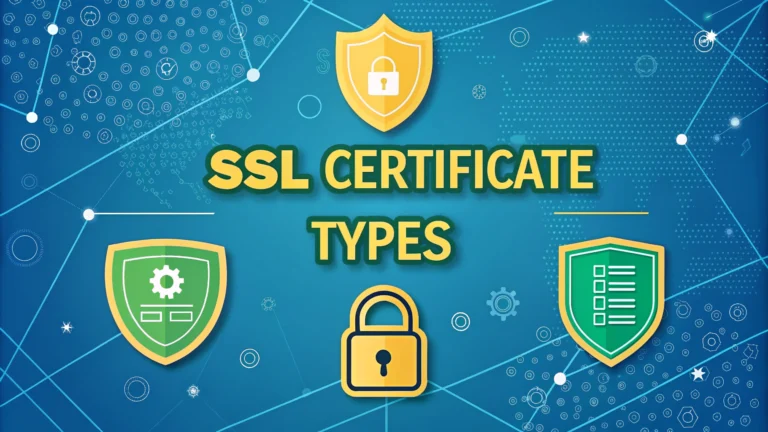SSL certificates protect websites by encrypting data transmitted between servers and visitors, ensuring secure online interactions across multiple digital platforms.
Domain Validation (DV) Certificates
Domain Validation certificates offer basic website encryption with minimal verification requirements.
Hosting providers typically issue these certificates quickly and automatically after domain ownership confirmation.
DV certificates are ideal for personal blogs, small websites, and platforms without sensitive transaction processing.
Organization Validation (OV) Certificates
Organization Validation certificates provide enhanced security by verifying the legal entity behind a website.
These certificates require businesses to submit official documentation proving organizational legitimacy.
Website visitors can view verified company details directly in the certificate, increasing trust and credibility.
Extended Validation (EV) Certificates
Extended Validation certificates represent the highest level of website authentication and security standards.
Complex verification processes include rigorous background checks and extensive documentation requirements.
Browsers display a green address bar or company name, signaling maximum security to potential customers.
Wildcard SSL Certificates
Wildcard SSL certificates secure a primary domain and unlimited subdomains with a single certificate.
These certificates save money and simplify management for complex website infrastructures.
Ideal for organizations with multiple subdomains like blog.example.com, shop.example.com, and support.example.com.
Choosing the Right SSL Certificate
Select an SSL certificate based on your website’s specific security requirements and budget constraints.
Consider factors like transaction volume, data sensitivity, and customer trust expectations.
Consult with your hosting provider or a cybersecurity professional for personalized recommendations.
Pricing Comparison
| Certificate Type | Average Annual Cost | Verification Level |
|---|---|---|
| Domain Validation | $0-$50 | Low |
| Organization Validation | $50-$200 | Medium |
| Extended Validation | $100-$500 | High |
Multi-Domain (SAN) SSL Certificates
Multi-Domain or Subject Alternative Name (SAN) certificates provide comprehensive protection for multiple distinct domains under a single certificate. These versatile security solutions are particularly beneficial for businesses managing multiple web properties or complex digital ecosystems.
Organizations can typically secure between 2-100 domains depending on the specific certificate package. This approach offers significant cost savings compared to purchasing individual SSL certificates for each domain.
SAN certificates are especially valuable for enterprises with diverse digital assets, including different brand websites, regional platforms, or interconnected web services. They simplify certificate management and reduce administrative overhead.
Key advantages include simplified renewal processes, centralized security management, and flexibility in domain configuration. Businesses can easily add or remove domains throughout the certificate’s validity period.
Ideal candidates for SAN certificates include multinational corporations, digital agencies, and organizations with complex web infrastructures that require streamlined security deployment.
Unified Communications Certificates
Unified Communications (UC) certificates are specialized SSL solutions designed primarily for Microsoft Exchange and Office Communications Server environments. These certificates enable secure communication across multiple Microsoft platforms and services.
UC certificates support secure email, instant messaging, and voice communication protocols. They provide robust encryption for complex enterprise communication infrastructures, ensuring data protection across different communication channels.
Unlike standard SSL certificates, UC certificates offer enhanced flexibility for Microsoft-centric organizations. They can simultaneously secure multiple server addresses and communication endpoints within a single certificate framework.
Advanced features include support for multiple Subject Alternative Names (SANs) and compatibility with various Microsoft communication technologies. This makes them particularly attractive for large enterprises with complex digital communication ecosystems.
Organizations leveraging Microsoft’s collaborative tools and communication platforms will find UC certificates an essential component of their cybersecurity strategy.
Code Signing Certificates
Code Signing certificates are specialized digital certificates that authenticate software developers and verify the integrity of software code, applications, and digital downloads. These certificates play a crucial role in establishing trust between software publishers and end-users.
Developers use Code Signing certificates to digitally sign executable files, scripts, and applications, proving the software’s origin and ensuring it hasn’t been tampered with since publication. This process helps protect users from potentially malicious or compromised downloads.
Major software platforms like Microsoft Windows, Apple macOS, and mobile operating systems recognize and validate Code Signing certificates. This recognition reduces security warnings and provides a smoother installation experience for end-users.
Different types of Code Signing certificates are available for various development environments, including standard software, mobile applications, and kernel-level drivers. Each type offers specific validation and security features tailored to different development needs.
Developers and software publishers can choose between individual and organizational Code Signing certificates, with the latter providing more comprehensive verification and increased user trust.
Conclusion
Selecting the appropriate SSL certificate is a critical decision that directly impacts website security, user trust, and digital reputation. By understanding the various certificate types and their specific use cases, organizations can implement robust cybersecurity strategies.
As cyber threats continue to evolve, investing in comprehensive SSL protection is no longer optional but essential. Regular assessment of security needs and staying informed about emerging certificate technologies will help maintain optimal digital security.

